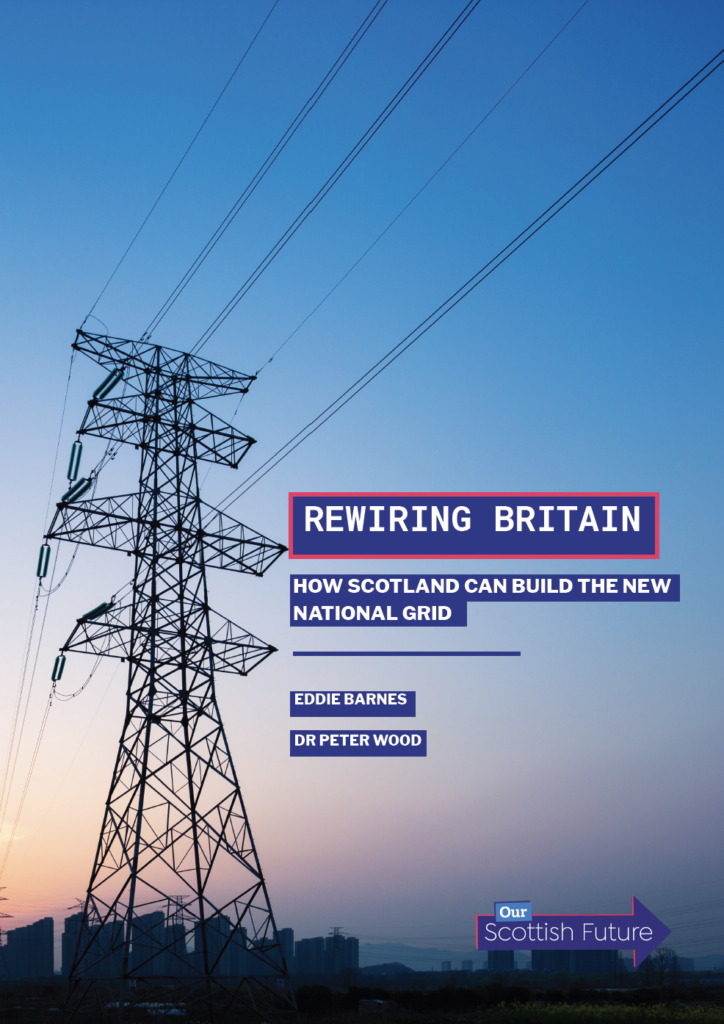The multi-billion pound effort to “rewire” Britain’s electricity grid should be led from Scotland, helping to create up to 200,000 green jobs, a paper by Our Scottish Future declares today.
The massive grid revamp is needed as Britain seeks to double the amount of electricity it produces in the coming decade, in order to cut out reliance on oil and gas.
Today’s Our Scottish Future paper says that the UK should lean on existing Scottish know-how in digital innovation to develop the new “clean grid”. It also calls on UK Ministers to learn the lessons of the wind power roll-out by building up advanced manufacturing skills and expertise in the UK to supply the new technology – rather than seeing the jobs and spending go abroad.
Given Scotland’s world-leading capability in energy infrastructure, the paper says firms in Scottish towns and cities should be at the forefront of the next UK Government’s plans.
It comes with Rishi Sunak preparing to unveil new proposals on how to increase capacity on the grid, and after Labour’s shadow Chancellor Rachael Reeves and Energy Secretary Ed Miliband unveiled the party’s intention to “rewire” the UK at Labour conference this week.
Labour’s planned “GB Energy” could incorporate the group’s proposals through being given a “Charter Mission” to rewire investment flows across the UK. The party has suggested using GB Energy to build “faster and cheaper” by “opening up new grid construction to competitive tendering”. Applying the think tank’s principles would mean including a requirement to support high-value research and advanced manufacturing facilities outside the South East.
Report author Dr Pete Wood says today: “Net Zero is a once-in-a-generation opportunity to rewire the UK.”
“Sweeping energy reforms are being sketched out by the political parties. Our practical suggestions suggest how to achieve those goals by building upon Scotland’s world leading strengths, running investment north to rebalance the country.”
“In Holyrood, government must not miss this chance to regenerate communities and rebuild job prospects in some of our most deprived areas. Together we can steer a path to Net Zero that leaves our communities stronger than they were before.”
OSF Director Eddie Barnes added: “The next UK Government will undertake an immense task, essentially to rewire Britain. This paper calls for Scotland to be at the heart of this massive UK project.”
“We need to learn from the introduction of wind power over the last 20 years. Britain failed to take full advantage: jobs that could have been created here were instead created abroad.”
“As we turn to the equally huge task of rewiring the country, we argue that, this time, we develop the skills and the supply chain to create new jobs in Scotland.”
The paper’s detailed recommendations propose that:
– Glasgow to host the Future System Operator, drawing upon the existing presence of the existing energy regulator, Ofgem.
– Dundee to be the focus of the digital programme to speed up planning for infrastructure, enabling greater data sharing, faster route design, along with an integrated web portal for supporting community engagement and careers.
– Aberdeen to be the coordination hub for the strategic Marine Environmental Assessment, supporting the diversification and future-proofing of the North East energy sector’s transition into offshore renewables.
– The Highlands and Islands’ education providers to host a Scottish consortium for identifying skill gaps in rural areas. Bursaries of up to £5,000 should be investigated to support training and education in remote rural areas experiencing skills shortages, to ensure that communities hosting infrastructure feel the benefits.
It also proposes that the Scottish and UK Governments should work to develop high-growth firms in Ayrshire and Fife, where expertise already exists to construct the new High Voltage Cables that the new grid will require. This work could take in Labour’s aim for GB Energy to increase competition, by supporting Scottish manufacturing to anchor a new British supply chain.
At Labour conference this week, Mr Miliband promised to remove the barriers to new grid development. He estimates that £200bn of private investment is ready to be poured into new grid development, supporting as many as 220,000 new jobs.









